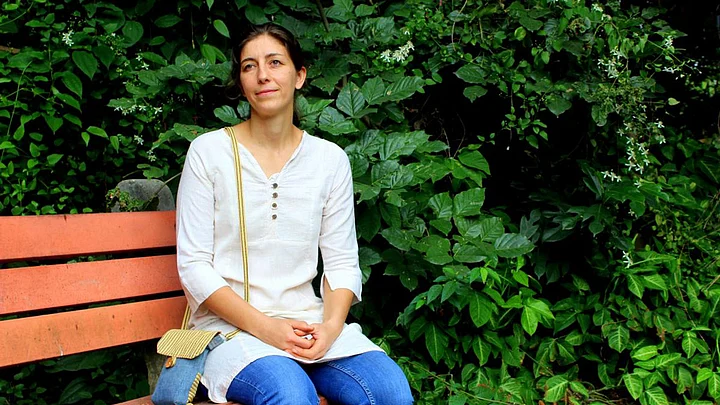Garbage on Indian roads is a common sight, hardly thought-provoking. But spotting a coffee mug she had discarded on the street in front of her house some years ago, a French woman settled in Namma Bengaluru got thinking.
These days, on a Sunday, you can find Claire Rao in one of the little corners of Cubbon Park, explaining to hovering onlookers what solid waste management is.
In a small stall set up by the Solid Waste Management Round Table (SWMRT) near the tennis court, Claire is enthusiastically explaining why it is better to use menstrual cups instead of sanitary napkins at one moment, and immersing her hands in a bucket of compost the next.
Along with other volunteers, she talks about the importance of segregation at source, composting and how to live without plastic.
The 39-year-old French national relocated to India with her Indian husband in 2006 and has been an active voice in promoting solid waste management in the city for the past few years.
So much so that “When people see me, they speak about garbage,” she quips.
Better Waste Management
Growing up in France, composting was a familiar practice, but in India, she says, “Garbage is in your face.”
Stating that Bengaluru generates 4,500 tonnes of waste every day, Claire says:
This is our waste and so it is our responsibility. We cannot depend on the BBMP for everything and need to do our bit.
—Claire
She later met Vani Murthy, a waste management and composting enthusiast who also lives Malleswaram, and the pair formed a resident’s welfare association along with a few other women in 2010. A year later “We Care for Malleswaram” was born. The group works towards spreading awareness on better waste management in the area. Apart from the fact that it functions on a micro level, being active on social media has also helped the group get noticed.
The response from the residents was not very keen initially, but that slowly changed. People are more aware today.
—Claire
Claire, who joined SWMRT earlier this year, often spends her Sundays in either Cubbon Park or Lalbagh showing people how to use natural resources judiciously and de-clutter the environment. More importantly, she practices what she preaches.
“Zero Waste” is the Mantra
From carrying her own bag to the provision store to avoiding buying packaged food products like chips and biscuits, from not buying synthetics to ditching the car for the cycle whenever she can, Claire has made “zero waste” the mantra of her life.
I prefer shopping from the local market also because it is a sort of community building exercise.
—Claire
While doing this “is a way of life” for her where she is “constantly learning,” Claire says that her family is free to make their choices.
I live in a joint family with 12 members. I can’t expect everyone to follow my ways. Yes, there is the occasional plastic here and there, but I make sure that all the kitchen waste from the house is used for making compost and gardening.
—Claire
Of the many roles she juggles, one is also of running an NGO called Nakshatra Trust. “I support a school in Benson Town for underprivileged children. We have 500 students now,” she says as she proudly narrates her plans to introduce music and sports in the school sometime soon.
“Change is Possible”
Living in Bengaluru has generally been a positive experience for her. Although she hasn’t experienced any major culture shocks, she calls the treatment she has received by many as “positive segregation”, courtesy her “white skin”. “Which is sad,” she states.
But she too has done her bit to fit in.
I have learnt a little Kannada. For now, enough to speak to vegetable vendors and to the local shops.
—Claire
Bengaluru has emerged as the cleanest state capital in the recently released Swachh Bharat rankings. Claire credits it to the collective work of civic officials, NGOs and garbage collectors.
She feels that we all need to chuck our habit of making excuses and develop basic civic sense along with the determination to say “no”.
“Change is possible,” she says as she heads back home to spend the day with her children.
(Monalisa Das is a reporter with The News Minute)
(At The Quint, we question everything. Play an active role in shaping our journalism by becoming a member today.)
